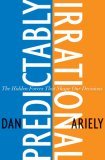io9: “The Twenty Science Fiction Novels that Will Change Your Life”
February 29, 2008
io9 has a good list of science fiction novels “that will rearrange how you think”; read down into the comments for more suggestions.
books on the mind, consciousness, cognitive science…
February 29, 2008
io9 has a good list of science fiction novels “that will rearrange how you think”; read down into the comments for more suggestions.

Predictably Irrational: The Hidden Forces That Shape Our Decisions by Dan Ariely is a recent book that is currently #13 at Amazon. Amazon has “Search Inside” for this book, plus some related videos.
From the book description:
In a series of illuminating, often surprising experiments, MIT behavioral economist Dan Ariely refutes the common assumption that we behave in fundamentally rational ways. Blending everyday experience with groundbreaking research, Ariely explains how expectations, emotions, social norms, and other invisible, seemingly illogical forces skew our reasoning abilities.
Not only do we make astonishingly simple mistakes every day, but we make the same types of mistakes, Ariely discovers. We consistently overpay, underestimate, and procrastinate. We fail to understand the profound effects of our emotions on what we want, and we overvalue what we already own. Yet these misguided behaviors are neither random nor senseless. They’re systematic and predictable—making us predictably irrational.
From drinking coffee to losing weight, from buying a car to choosing a romantic partner, Ariely explains how to break through these systematic patterns of thought to make better decisions. Predictably Irrational will change the way we interact with the world—one small decision at a time.
Website for the book
This would make a nice pair with another recent book – The Logic of Life.
February 27, 2008
When we say that we’re conscious, then, we’re doing something: we’re talking (or signing or writing) and/or imagining to ourselves about both our external and internal environments, and our own public and private behavior.
“Consciousness is nothing but a word” by Henry D. Schlinger at eSkeptic
February 26, 2008
One of the new reviews at Metapsychology Online Reviews looks at ‘What Are We? A Study in Personal Ontology’ by Eric T. Olson (Oxford University Press, 2007)
An interesting post at the Language Log on the Whorfian hypothesis: “Poor, arid, and, in appearance, deformed”
At least in lexicographic terms, the Indo-European languages do not, contrary to what Whorf says, share a linguistic history that predisposes their speakers unconsciously to a particular physics of time, distance, velocity and so on. In particular, the English words for those abstract physical concepts developed rather late, mostly as part of a conscious effort to import or develop explicit physical theories. And the terms used were figurative or metaphorical extensions of much juicier and more concrete words for things like “strength” and “discord” and “being alive”.
